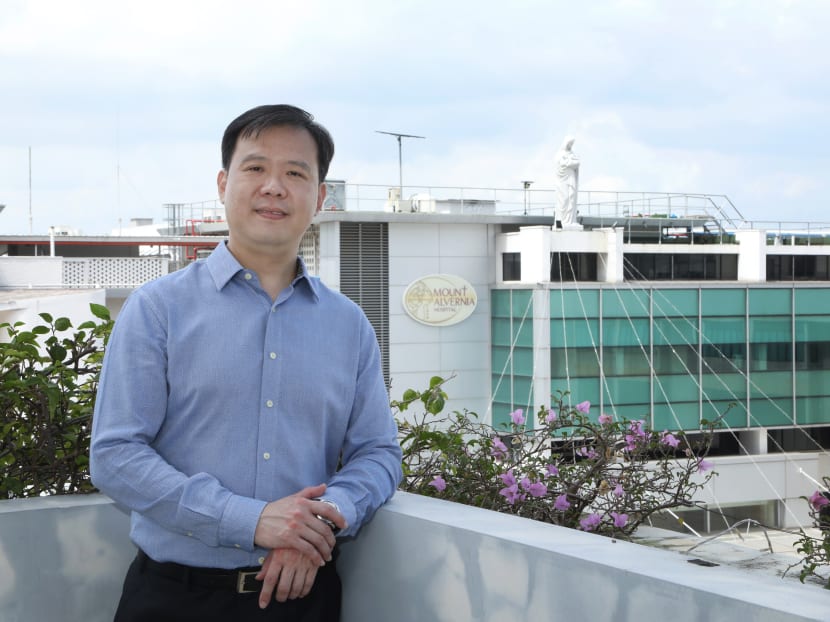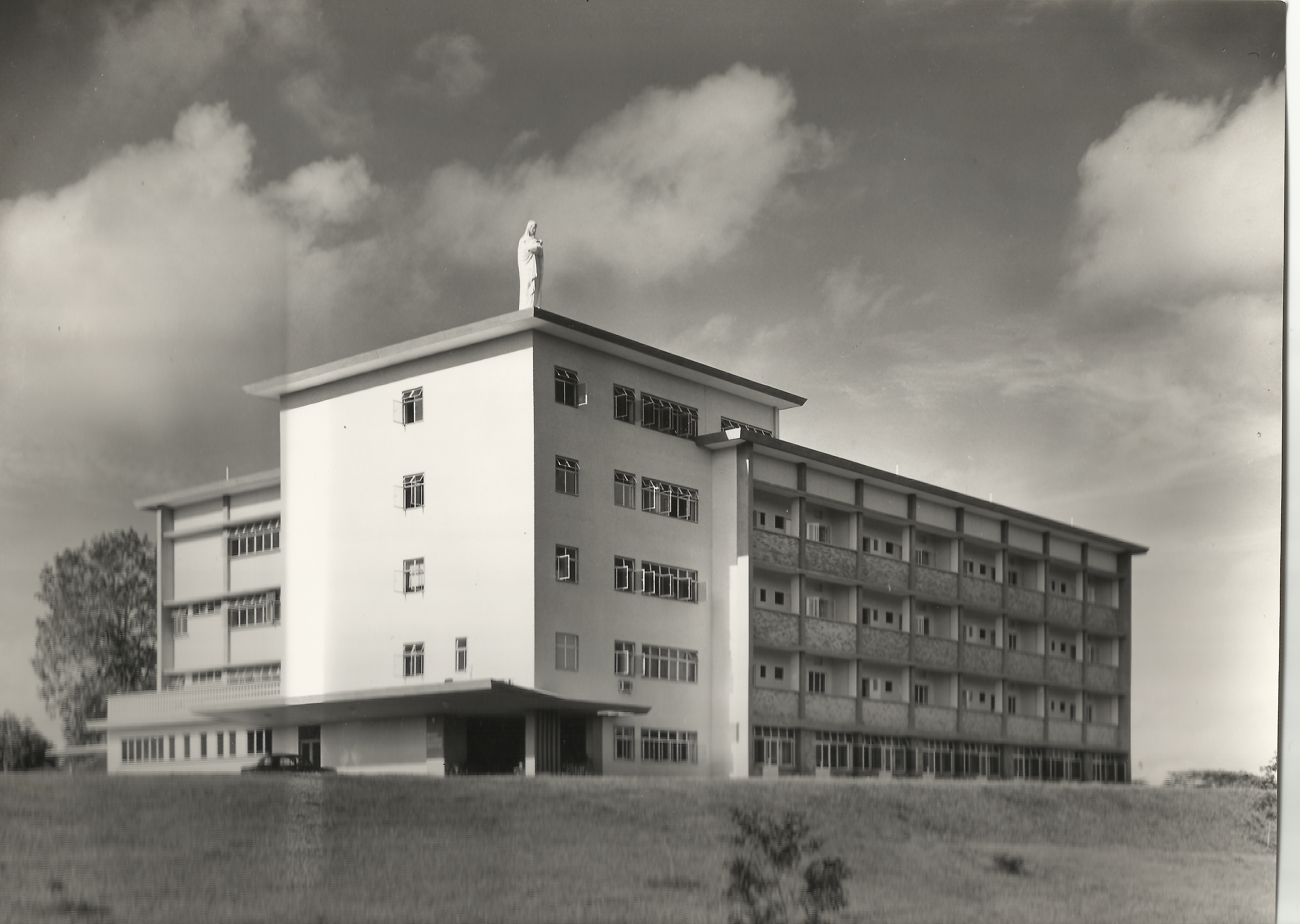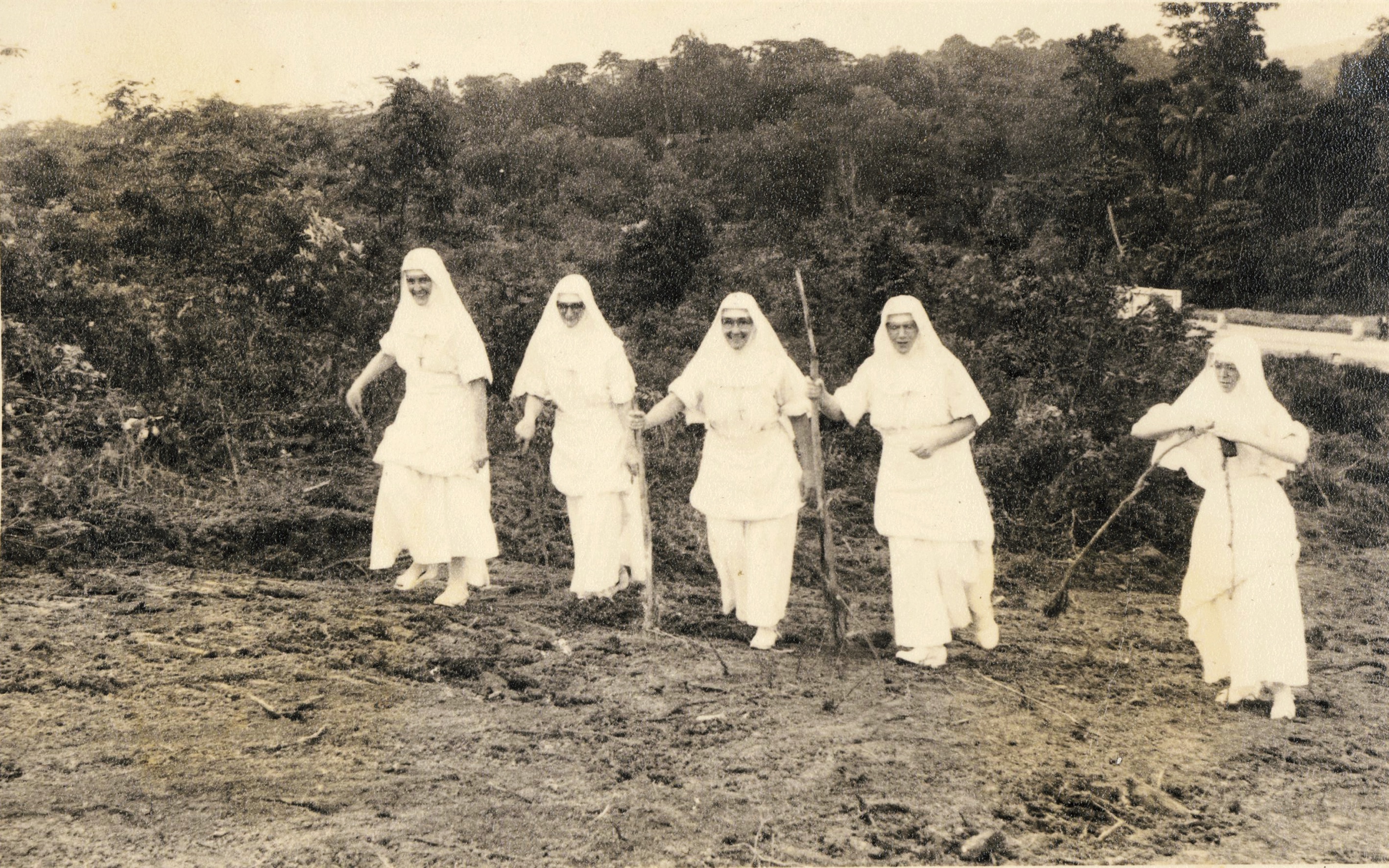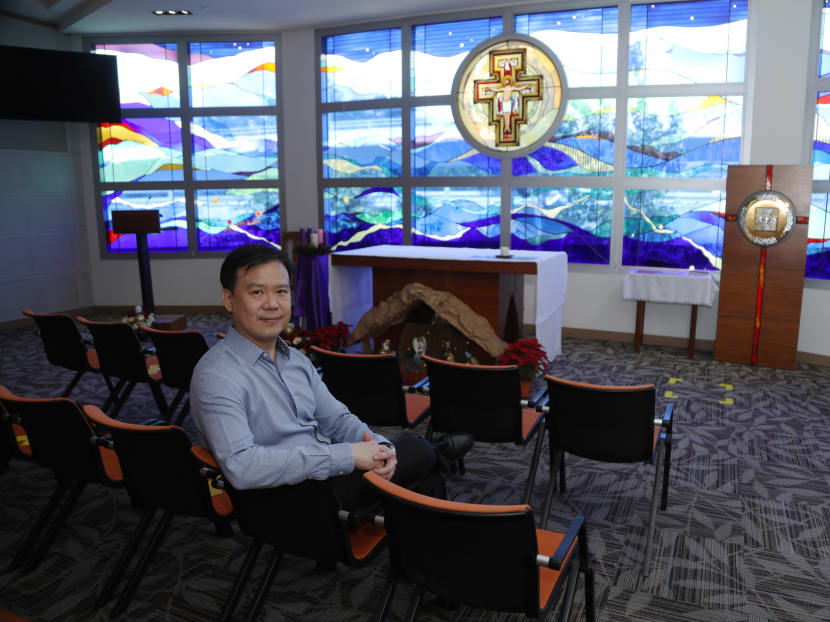Mt Alvernia Hospital turns 60 during Covid-19 pandemic, CEO expresses ‘heartache’ at losing good workers
SINGAPORE — More than half a century ago, Mount Alvernia Hospital opened with just 60 beds. All it had was a crew of about 30 Roman Catholic nuns doubling up as nurses and performing all sorts of clinical and operational duties.

Dr James Lam Kian Ming, chief executive officer of Mount Alvernia Hospital.
- Mount Alvernia Hospital, which opened in 1961, has been serving people here for 60 years
- Like other hospitals, Covid-19 has worn down its workers and it has lost some of them to other countries
- Its CEO James Lam is also concerned about patients putting off non-Covid-19 follow-ups in the past two years
- The hospital is the only not-for-profit private hospital here offering tertiary care and it has other unique features
- Its core values and its rich history had attracted the CEO to work there
SINGAPORE — More than half a century ago, Mount Alvernia Hospital opened with just 60 beds. All it had was a crew of about 30 Roman Catholic nuns doubling up as nurses and performing all sorts of clinical and operational duties.
What powered them to work — without the modern “personal protective equipment” available during this Covid-19 pandemic now — was their dedicated, never-say-die attitude to serve and heal the sick, backed by their strong religious beliefs.
Now, during this prolonged Covid-19 pandemic, these nuns are no longer the dominant figures walking around the grounds of the hospital, whose presence had been living reminders of the resilience needed to serve those in need.
The hospital located on Thomson Road turned 60 this year.
It is Singapore’s first private hospital and the only not-for-profit private hospital here providing acute tertiary care.
Dr James Lam Kian Ming, 51, its chief executive officer, told TODAY that the hospital had planned a celebration to mark its 60th anniversary but as with all things, this was derailed by Covid-19.
Last Wednesday (Dec 8), as part of celebrations for the founding of the Roman Catholic Church in Singapore 200 years ago, he gave a presentation at the Cathedral of the Good Shepherd in the Bras Basah district on the hospitals' past contributions and upcoming projects.
Like other hospitals coping with the global health crisis that is Covid-19, Mount Alvernia Hospital faces an advancing problem: Healthcare workers on the front lines showing unprecedented signs of exhaustion and burnout.
Dr Lam is aware of the worrying trend of more healthcare workers leaving the sector and how that would play out in the long run, even though he recognised the complexities of dealing with the issue.
The pandemic has pushed new ground in some areas such as triage — assessing and prioritising patients based on how urgent and serious their illnesses are — and the adoption of technology have gotten better, he said.
However, employee attrition, burnout and mental stress continue to be a point of concern, especially for foreign healthcare workers who may not be able to go home to be with their family.
Dr Lam said: “Even if they want to take leave, some of their home countries may not allow entry. That is something we are very concerned about.
“Anecdotally, we know we are also losing some of our foreign staff like nurses to other countries.
“Every country’s healthcare team will be burned out and everybody will need reinforcement, so those countries are welcoming healthcare staff and rolling out the red carpets, maybe giving them and their families permanent residency or citizenships.”
Dr Lam spoke of the “heartache” that comes from losing a healthcare worker, especially one who has had years of experience and training in his or her field of work. The hospital could not provide specific figures on how many have left.
“Some of the healthcare staff are already very well-trained in Singapore. Not only that, they have also become very localised, as part of the system and part of our society,” he said.
“I feel that to lose them, for example, after five to eight years’ experience as an operating theatre nurse or intensive care unit nurse — it’s very ‘heartache’.”
However, he also acknowledged that it is not a matter that can be easily tackled at an institutional level.
“Maybe we should review strategies at a higher systemic level to see how we can keep these colleagues with us for a longer term,” he suggested.
Last month, Dr Janil Puthucheary, Senior Minister of State for Health, disclosed in Parliament that resignation rates among healthcare workers, including foreign doctors and nurses, are going up.
Around 1,500 healthcare workers resigned in the first half of this year compared with the 2,000 yearly before Covid-19.
Dr Puthucheary said that the resignations were mostly tendered for personal reasons, such as migration or moving back to one’s home countries.
He also said that signs of fatigue can be seen among healthcare workers who have been battling the pandemic for more than 20 months, with a large proportion unable to take leave since last year.
In attending to the various stresses on doctors, nurses and other healthcare workers, Mount Alvernia Hospital relies on a team that is unique to it.
It is the only hospital here that has a clinical pastoral care team.
This unit looks after the emotional and spiritual needs of patients, their families and employees regardless of their religion.
Dr Lam said: “Our clinical pastoral care team is amazing and it’s a unique service we provide. They play a very important role in patient care and also help our staff when they feel stressed. We also extend the service to doctors.
“During this pandemic, we have appealed to our staff not to be shy to reach out to our clinical pastoral care colleagues who can lend a listening ear. They are all trained to give advice.”
The 16-member team, which includes three nuns, is made up of Catholics and Christians who are trained in clinical pastoral education.
10 things you may not know about Mount Alvernia Hospital

1. Three Roman Catholic nuns were the pioneers who started the initiative to build the hospital.
Sister Angela McBrien, Sister Mary Camillus Walsh and Sister Mary Baptista Hennessy, first worked with tuberculosis patients at Tan Tock Seng Hospital, which then became known as Mandalay Road Hospital.
Later, they cared for patients in the Lepers Camp, an isolated community of lepers housed at Trafalgar Home in Woodbridge.
In 1952, they were given an opportunity to start a private hospital when medical facilities got increasingly crowded and there was a need for nursing care and healthcare services among the population.
They pooled their salaries, canvassed for donations and eventually collected enough to build one on what was then known as Thomson Hill.
2. Mount Alvernia Hospital was officially opened on March 4 in 1961 by philanthropist and businessman Lee Kong Chian, who had been one of the key donors.
In the first four months after it opened, the Singapore Free Press reported at the time that 10 per cent of the patients received free treatment.
The nurses working there were from the Franciscan Missionaries of the Divine Motherhood (FMDM), an international religious congregation of Catholic women and nuns.
The hospital is wholly owned by the FMDM congregation.
It continues to cater to all Singaporeans and foreigners regardless of religion, race and nationality.
3. In the earliest days, the nuns running Mount Alvernia Hospital numbered around 30.
They were professionally trained in England as nurses, midwives, physiotherapists, radiographers, laboratory technicians and dispensers.
They did everything themselves at the hospital. They scrubbed off blood clots and stains from bedlinen. They cooked meals for the patients, washed dishes, cleaned the rooms and even drove an ambulance — all while juggling clinical and operational responsibilities.
4. The hospital’s present CEO James Lam Kian Ming said that Sister Andreina Chin, one of the nuns from the pioneer cohort, is now retired and still living at the St Francis Convent within the hospital compound.
After training in England and Ireland, she returned to Singapore in 1964 and helped to set up a department of pathology and a blood bank, making Mount Alvernia Hospital the only private hospital in Singapore to have its own blood bank at the time.
5. A unique feature of the hospital, which is known for its obstetrics and paediatric services, is its chapel.
There, patients may get their babies blessed by a member of the clinical pastoral care team. The parents get a photograph in a card with the baby’s name.
Ms Karen Poon, director of missions at the hospital, said that the service was offered to Catholics at first. “Later, there were patients who asked us, ‘Eh, how come they have a special service and we don’t have?’ So we decided to bravely ask the others as well if they wanted it.”
Dr Lam said that among the parents who asked to have their babies blessed, more than half are not Christians.
“If you ever have a chance to go to Mount Alvernia Hospital to visit a patient, for example, do drop by the chapel,” he added.
“A lot of my solutions to my difficult problems are answered in the chapel when I go there for reflection and prayers.”
6. It is working on new projects to cater to the growing needs of patients.
Dr Lam said that the hospital is adding a new 10-storey block to house maternity and paediatric services including delivery suites and a neonatal intensive care unit, but the opening — which was meant to be in November — has been delayed due to the pandemic.
An integrated cancer centre is also a work-in-progress due to construction hold-ups for almost a year. It will hopefully be ready next year, he said.
7. There is no charge for tending to emotional needs of people under its care.
Being the only hospital here that has a clinical pastoral care team, which looks after the emotional and spiritual needs of patients and their caregivers, it means that patients may ask staff members at the wards for a pastoral carer if they want a listening ear or are anxious about their impending surgery and want someone to pray with them or talk to them, for instance.
For services rendered by this team, the hospital does not charge patients.
8. The hospital has outreach programmes for the needy.
These include general practitioner and dental clinics at Enabling Village in the Lengkok Bahru-Redhill area and Agape Village in Toa Payoh for the vulnerable. Patients get heavily subsidised treatments.
The inclusive dental clinic at Enabling Village has a tilter for dental works so that patients need not get out their wheelchairs. Fees are priced from $10 a visit.
9. In 2004, TODAY reported that the hospital started looking at foreign patients in the medical tourism market.
It is a not-for-profit hospital so the surplus from the tourist dollar was to fund its overheads and subsidiaries, which include Assisi Hospice as well as medical missions overseas. The hospice provides palliative care for the terminally ill in home-care, in-patient or day-care settings.
10. Dr Lam hopes the hospital may continue to do more in the outreach space.
“What else can we do? Are there current gaps that we can help plug in the healthcare system?”
Referring to the hospital’s founders who had helped bridge the gap in healthcare needs among the population in the early days, Dr Lam said: “When the nuns started the hospital, they had nothing and no fear.
“Not forgetting, too, that they were Westerners from Europe who did not speak our languages in those days when people here spoke dialects like Hokkien and Cantonese, but they still came, got on with it and got things done.

CATCHING UP WITH NON-COVID-19 PATIENTS
Another thing that Dr Lam is concerned about is the impact that the prolonged pandemic has on patients with chronic conditions who have postponed their non-Covid-19 appointments and treatments.
Mount Alvernia Hospital, which has 319 beds in total, has set aside two wards with 86 beds to take in Covid-19 patients.
“Giving up beds (to Covid-19 patients) will indirectly affect this. At some point, we need to catch up (with these patients who have postponed appointments). The effort won’t be small because it’s been a long two years.”
Although treatments for serious conditions such as stroke, infections, heart problems and cancer have continued in the past two years, there could be potential negative outcomes due to patients putting off treatments for their other medical conditions, Dr Lam said.
“It is a big unknown that will be hard to assess. Take patient suffering, for example.
“Let’s say I’m an elder with a bad knee and need a total knee replacement. If I delay the operation, will I die? No.
“But will I suffer? Yes, because by the time the doctor and patient decide they want to do the knee replacement, the pain up to that point would have been quite excruciating.
“Also, because of the delay, if there is a fall, a fracture occurs and the patient is hospitalised, one thing could lead to (other complications),” he added.
“When you have a build-up of unpleasant experiences, this sometimes push people out of the industry. That’s why I sometimes tell the team, for that one unpleasant incident, do not forget the other 99 patients who are very appreciative.Dr James Lam Kian Ming, chief executive officer of Mount Alvernia Hospital”
DRIVING UP HEALTHCARE STANDARDS
The pandemic has certainly driven healthcare services to improve in some aspects, of work processes and human behaviour needing to be changed to align with unexpected or urgent needs.
Dr Lam said: “As social creatures, we have been ‘anti-social’ for two years to fight the pandemic so everyone is stressed. When there is a trigger, there may be a flare-up.”
There have been unpleasant experiences with visitors, relatives and even patients, he added.
“I think as healthcare workers, we are on the receiving end. Therefore, we all need to be more resilient, and I think the customer service aspect has levelled up.”
THE VALUE OF 'PEACE'
Dr Lam joined Mount Alvernia Hospital in 2017. He said that he was inspired by its rich history and founders.
Before that, he served as CEO of Thomson Medical Group and was also the group director of the Applied Sciences Group and Blood Services Group at the Health Sciences Authority.
Through tough times like these, Dr Lam hopes that the team would be reminded of and embrace the hospital’s core values of “compassion, humility, integrity, respect and peace”.
These were the values upheld by the hospital’s founding Catholic nuns, who had arrived in Singapore in the late 1940s to serve patients whom society had shunned.
“When I first joined Mount Alvernia five years ago, the core value of ‘peace’, in particular, really called out loudly to me.
“I have been in different organisations and I have never come across such a core value," Dr Lam said.
“It has helped me a lot as an individual. I like to joke that in Mount Alvernia, when we quarrel, we try to do so peacefully.
“If we can embrace this value (of peace), it will help us grow as a person. If we practise it, patients and relatives will benefit.”
His hope is that the team at Mount Alvernia would find peace and satisfaction in their work, and “appreciate the loveliness of being a healthcare worker, so that it is no longer just a job anymore, it becomes rewarding for them”.
He said: “Working in the healthcare sector is a calling and blessing but because of the stress of daily living, challenging customers and workload to manage, many of us in healthcare may have forgotten that.
“When you have a build-up of unpleasant experiences, this sometimes push people out of the industry.
“That’s why I sometimes tell the team, for that one unpleasant incident, do not forget the other 99 patients who are very appreciative.”

On his part, Dr Lam also tries to walk the talk when handling work challenges.
He said that he is a “fairly peaceful” person and believes in the importance of communicating clearly and putting in effort to “listen more, not just hear”.
When handling complaints or issues at work, he views these challenging moments not as problems but as opportunities to show more compassion and settle the matter “peacefully”.
A TOUGH BUT MEANINGFUL MISSION
Dr Lam said of the other reason why he chose to join the hospital: “What appealed to me a lot is that Mount Alvernia is a not-for-profit hospital, which sets us apart from the rest of the hospitals in the private sector.”
As a not-for-profit hospital, annual surplus generated does not go back to shareholders. It also does not raise funds like a charity.
The surplus is used in several ways, for example, ploughed back to the hospital’s development and reserves. It also goes into supporting community outreach activities for needy patients.
He knows that it will be not be easy to run a mission hospital like this with healthcare costs rising and needing to keep the business sustainable.
“While swimming in a sector that is very high-cost, maintaining good quality in healthcare cannot be compromised.
“We are competing in the same space for resources as other hospitals while trying to keep our fees reasonable, maintaining quality standard as well as doing things that are unique to Mount Alvernia,” he said.









